
The largest provider of business education in Africa and one of the largest in the world
Unisa’s North-Eastern Region, in collaboration with the College of Economic and Management Sciences (CEMS), recently hosted the 6th Annual Dr OK Matsepe Memorial Lecture at its Polokwane Campus. This prestigious gathering paid tribute to the late acclaimed North Sotho author, Dr Oliver Kgadime Matsepe, in recognition of his immense contributions to literary discourse and social development in South Africa.
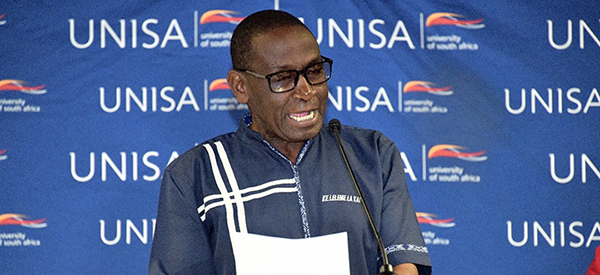
Keynote speaker Dr Diphete Bopape
Matsepe's legacy is foundational to Sepedi literature. His novels and poetry explored human experiences, cultural identity and community life. His literary achievements earned him two awards from the South African Academy for Arts and Science for Kgorong ya Mošhate (1964) and Megokgo ya Bjoko (1974).
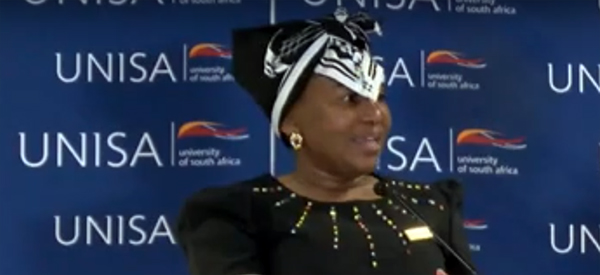
CEMS Acting Executive Dean, Dr Mantepu MaseTshaba
CEMS Acting Executive Dean, Dr Mantepu MaseTshaba, described Matsepe as a "cultural insurgent" and a "disruptor of the colonial imagination". She said, "In an era when the West sought to erase our stories, silence our languages, and dismiss our philosophies, Phukubyana defied this erasure and wrote us back into being. He did not write to appease the empire – he wrote to liberate us from it."
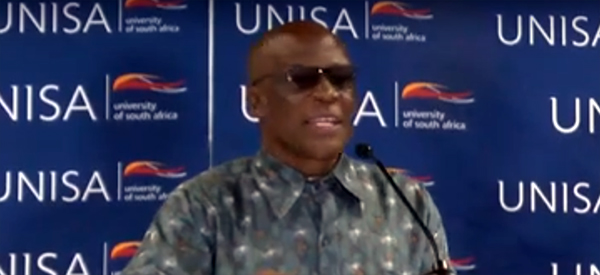
r Lesiba Molepo, Acting Regional Director, Unisa North-Eastern Region
In 2024, Unisa honoured Matsepe posthumously with an honorary Doctorate in Languages, Linguistics and Literature, acknowledging his unmatched contributions to South African literature and the Sepedi dialect of Sesotho sa Lebowa.
Held under the theme, "Preserving Culture, Traditions, and Languages Through the Legacy of Dr OK Matsepe", the memorial lecture served as a platform to reflect on the significance of indigenous languages in shaping identity, memory and intellectual sovereignty.
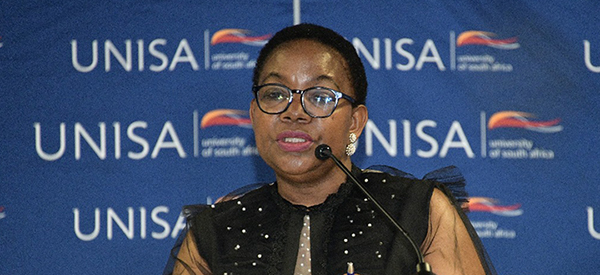
Limpopo MEC for Education Mavhungu Lerule-Ramakhanya
Delivering a message of support from the Office of the Premier in the Limpopo Provincial Government, MEC for Education Mavhungu Lerule-Ramakhanya emphasised that the theme of the day posed a challenge to all South Africans. "It challenges each one of us to shoulder the noble responsibility of safeguarding our indigenous languages," she said. "Our mission is to preserve the linguistic and cultural heritage that Dr Matsepe championed, nurturing it so that it not only thrives in academia but vibrantly pulses through every aspect of our society."
Keynote speaker Dr Diphete Bopape, founder and editor of Seipone Newspaper, is a celebrated writer, former schoolteacher, principal and college lecturer. Bopape was the first recipient of the EM Ramaila Prize for Literature (North Sotho), and his deep knowledge of Matsepe’s work and philosophy made him an ideal speaker for this year’s lecture.
Bopape chose to focus on language as a critical aspect of the theme, delivering an address titled "Breathing life into the silent African voices in preserving the legacy of Dr OK Matsepe". He did not mince his words, stating that African languages in South Africa are on the brink of extinction. "While on paper they are regarded as 'official languages', they never serve any official function and remain informal," he said. "They are not written and published for public consumption. Once languages are not written and no knowledge and information are preserved in them, those languages are ready to die. At the rate we are going, we are unlikely to succeed in preserving Dr OK Matsepe’s legacy when the language that lifted him to great heights is collapsing."
Bopape, who is also a clinical psychologist and hails from Ga Mamabolo in Limpopo Province, traced the roots of this crisis to the colonial era. He described colonisation as a systematic brainwashing process designed to erase everything Africans knew about themselves and to replace it with Western constructs aimed at perpetuating control. "The goal of colonisation was to turn Africans against themselves – to make them realise, feel, and accept that they are inferior creatures who could not defend themselves against guns and bombs," he asserted.
He continued, "Africans were brainwashed into believing that their culture, religion, traditions and languages were barbaric, backward and uncivilised. To be civilised, they had to adopt colonialists’ ways of life, including their languages."
Citing Britain and France as the two biggest colonial victors who imposed their languages across African nations – leading to the designation of Anglophone and Francophone countries – Bopape highlighted how these languages were, and still are, used in governance, education and public communication. "Mastery of these colonial languages depends on access to education, meaning that millions of Africans are excluded from systems that continue to reject and marginalise African languages and people. This is how African voices are silenced," he warned.
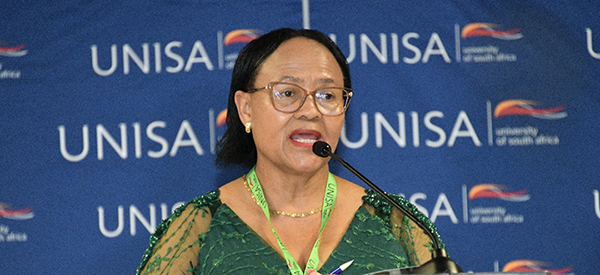
Prof Eunice Seekoe, Acting Vice-Principal for Teaching and Learning at Unisa
Prof Eunice Seekoe, Acting Vice-Principal for Teaching and Learning at Unisa, reflected on the significance of the memorial lecture. "We are grateful to have reached this milestone – the sixth edition of the Dr OK Matsepe Memorial Lecture," she said. "We’ve journeyed long with this South African polymath, and it raises an important question: How can this event inspire greatness in the youth?" She added, "In Sepedi we say 'ntepa e mpsha e segwa ka e taala' – the young learn from the experienced. As one of the oldest universities on the continent, we must ensure this celebration nurtures the future of our society and fosters a love for reading and writing."
The event was widely attended by Unisa’s leadership corps, and drew a host of esteemed guests, including Dr Mosibudi Mangena, former Minister of Science, Technology and Innovation, Dr M Makgopa, former Deputy Vice-Chancellor, University of Venda, and the Rammupudu, Rahlagane, Maroga, Sekororo, Maila and Masha royal families.
The programme was eloquently directed by Mohure Mamabolo, Lecturer in the Department of Business Management at CEMS who conducted the proceedings in fluent Sepedi.
* By Tebogo Mahlaela, Communication and Marketing Specialist, College of Economic and Management Sciences, with input from ChatGPT
Publish date: 2025-04-08 00:00:00.0